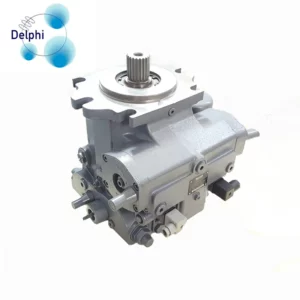A hydraulic pump is a mechanical device that converts mechanical power into hydraulic energy. It is used to generate fluid flow and pressure in a hydraulic system, which is then used to power hydraulic motors, cylinders, and other hydraulic components.
Hydraulic pumps can be classified into three main types: gear pumps, piston pumps, and vane pumps. Each type of pump has its own unique design and performance characteristics, and is selected based on the specific application requirements, such as flow rate, pressure, and efficiency.
Gear pumps are the most common type of hydraulic pump and are widely used in various applications due to their simplicity, reliability, and affordability. They consist of two meshing gears that rotate in opposite directions, creating a flow of fluid between the gears and the pump casing.
Piston pumps are used in applications that require high-pressure and high-flow rates, such as in heavy machinery and construction equipment. They consist of a series of pistons that move back and forth in a cylinder, generating fluid flow and pressure.
Vane pumps are used in applications that require low to medium pressure and low to medium flow rates, such as in power steering systems and machine tools. They consist of a rotor with vanes that slide in and out of slots in the rotor, creating a flow of fluid between the rotor and the pump casing.
Proper use and maintenance of hydraulic pumps is essential for safe and reliable operation. It is important to follow the manufacturer’s recommendations for use, including the fluid type and quality, pressure rating, and recommended use, and to avoid overloading or exceeding the weight capacity of the pump. Additionally, it is recommended to use safety equipment, such as safety stands or chocks, to prevent injury or damage in the event of an accident.
Regular inspection and maintenance of the hydraulic system, including the pump, hoses, and fittings, can help prevent damage and ensure safe and reliable operation of the pump. During the inspection, a qualified mechanic will check the hydraulic pump for any signs of wear, damage, or leaks, and will also check the fluid level and quality.
If you suspect that your hydraulic pump is not functioning properly, it is recommended to have it inspected and repaired by a qualified mechanic to ensure safe and reliable operation. It is important to address any issues with the hydraulic system promptly, as they can affect the performance and safety of your equipment and lead to more expensive repairs down the line.
Proper use and maintenance of hydraulic pumps and systems can help ensure safe and reliable operation, as well as extend the lifespan of the equipment. It is recommended to follow the manufacturer’s recommendations for use and maintenance, and to consult a qualified mechanic or technician for assistance with installation, repair, or maintenance of hydraulic pumps and systems.
There are several common issues that can arise with hydraulic pumps, including:
Leaks: Hydraulic pumps can develop leaks due to worn or damaged seals, gaskets, or hoses. Leaks can cause a loss of hydraulic fluid, pump hydraulics which can lead to reduced performance and damage to other hydraulic components.
Cavitation: Cavitation is caused by the formation of air bubbles in the hydraulic fluid, which can occur when the pump is operating at high speeds or under low-pressure conditions. This can cause damage to the pump and other hydraulic components, and can lead to reduced performance and efficiency.
Overheating: Hydraulic pumps can overheat due to excessive use, high ambient temperatures, or a lack of proper cooling. Overheating can cause damage to the pump and other hydraulic components, and can lead to reduced performance and efficiency.
Contamination: Hydraulic pumps can become contaminated with debris, dirt, or other foreign materials, which can cause damage to the pump and other hydraulic components. Contamination can also lead to reduced performance and efficiency.
Wear and tear: Hydraulic pumps can experience wear and tear due to regular use, exposure to harsh driving conditions, or damage from accidents or collisions. This can lead to reduced performance and efficiency, and can also cause damage to other hydraulic components.
If you suspect that your hydraulic pump is not functioning properly, it is recommended to have it inspected and repaired by a qualified mechanic to ensure safe and reliable operation. Regular inspection and maintenance of the hydraulicsystem, including the pump, hoses, and fittings, can help prevent damage and address any issues promptly.
During the inspection, a qualified mechanic will check the hydraulic pump for any signs of wear, damage, or leaks, and will also check the fluid level and quality. They will also check the hydraulic system for any signs of contamination or overheating.
To prevent common issues with hydraulic pumps, it is important to follow the manufacturer’s recommendations for use and maintenance, including using the right type and quality of hydraulic fluid, avoiding overloading or exceeding the weight capacity of the pump, and inspecting the hydraulic system regularly for signs of wear, damage, or leaks.
Additionally, it is recommended to use safety equipment, such as safety stands or chocks, to prevent injury or damage in the event of an accident, and to follow proper operating procedures to avoid unnecessary wear and tear on the hydraulic pump and other components.
Proper use and maintenance of hydraulic pumps and systems can help ensure safe and reliable operation, as well as extend the lifespan of the equipment. It is recommended to consult a qualified mechanic or technician for assistance with installation, repair, or maintenance of hydraulic pumps and systems, and to address any issues promptly to avoid more expensive repairs down the line.

